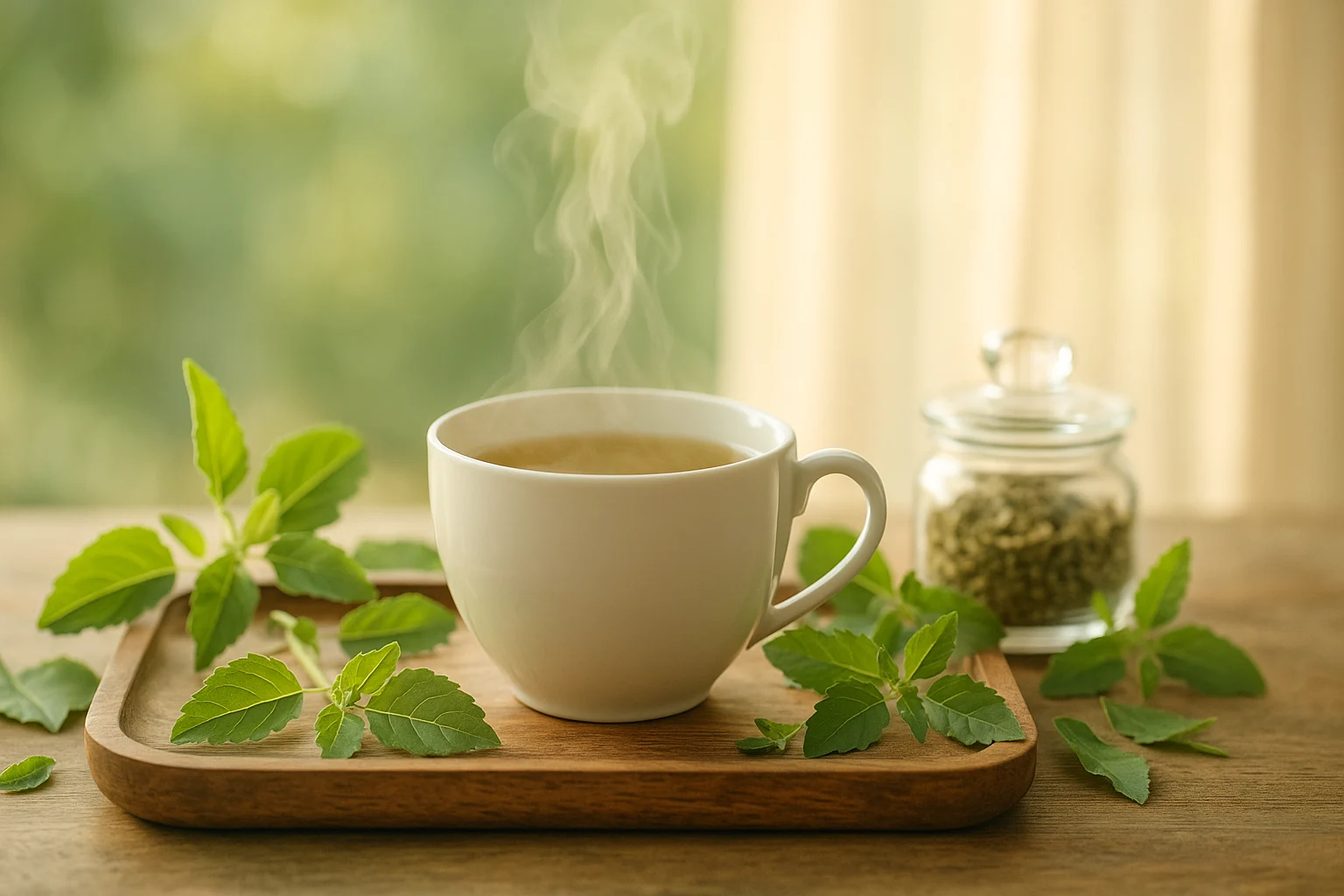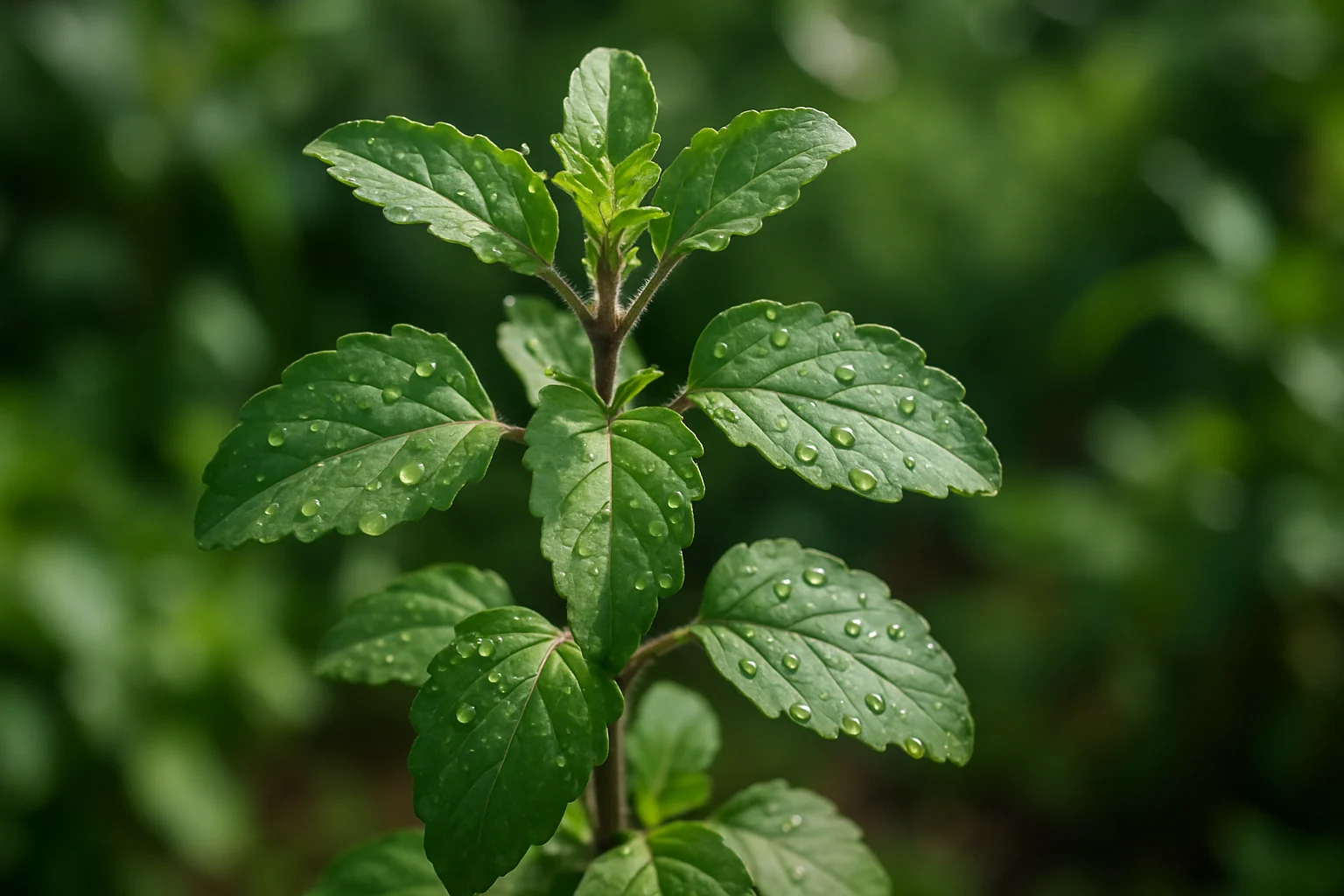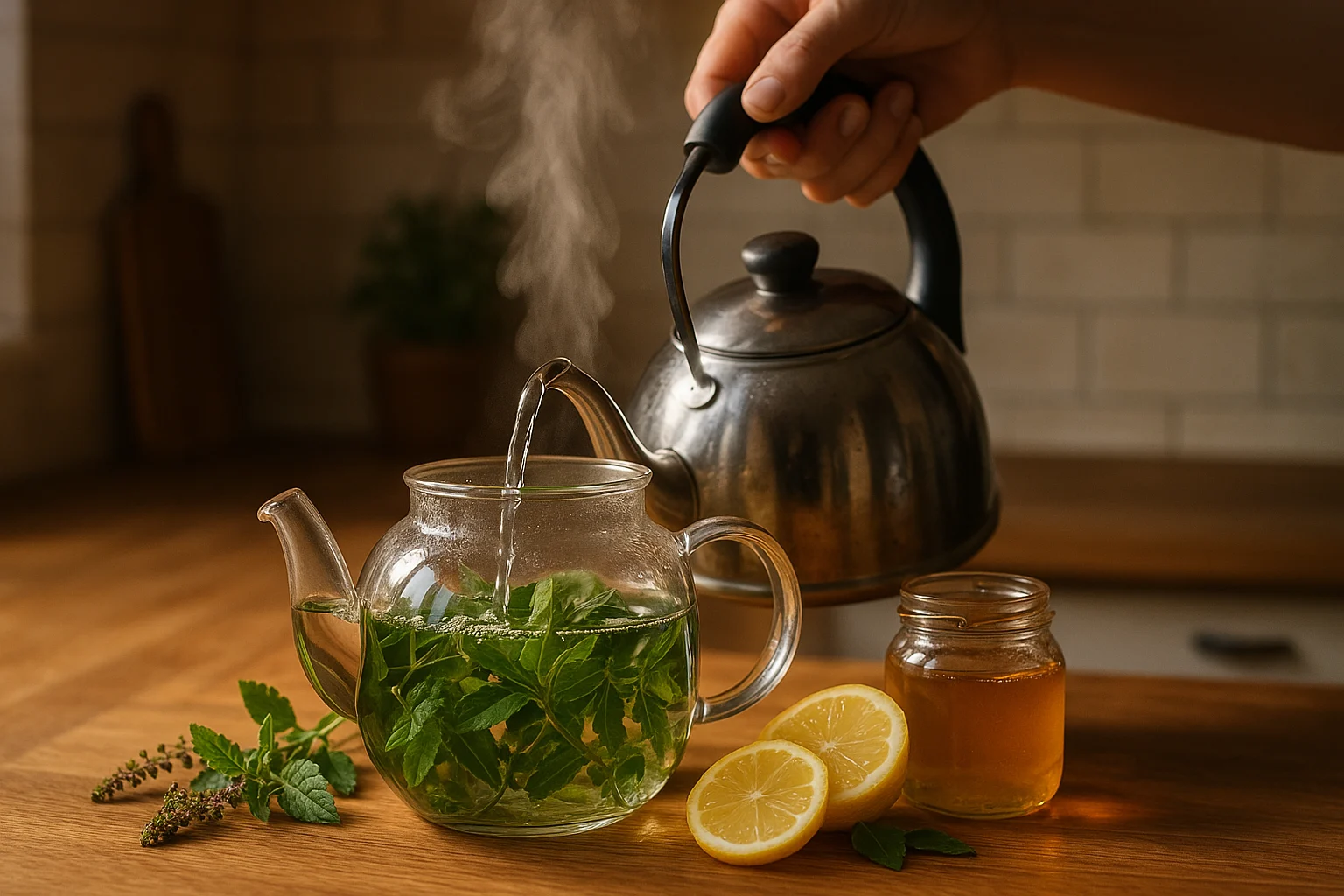
Feeling stressed or drained? The benefits tulsi tea may offer include a calmer mood and steadier energy. In today’s fast-paced world, natural balance is everything. Meet tulsi, or Holy Basil, Ayurveda’s “Queen of Herbs.” This sacred plant is more than a kitchen herb—it can be a thoughtful addition to your wellness routine. For women seeking natural solutions, the herbal tea health benefits of this herb are worth exploring. Curious how it fits into Ayurvedic daily practices for balance and renewal? Check our guide. Let’s explore the research-informed ways this cozy brew may support your wellness journey.
This page contains paid/affiliate links. As an Amazon Associate we earn from qualifying purchases, and we may earn commissions from other partners—at no extra cost to you. Links marked with ‘#ad’ are affiliate links, meaning we may earn a commission at no extra cost to you. Learn more.
Table of Contents
Benefits Tulsi Tea: Key Takeaways
- Stress Support: Tulsi’s adaptogenic profile may help the body manage everyday stress.
- Immune Support: Antioxidants help counter oxidative stress that challenges immune balance.
- Inflammation Balance: Compounds like eugenol may support a healthy inflammatory response.
- Digestive Comfort: Many people find this tea soothing when occasional bloating strikes.
- Holistic Wellness: Rooted in Ayurveda, it can complement a mindful routine.
Benefits Tulsi Tea: What Is Tulsi Tea?
Picture a plant so revered it’s called Holy Basil, cherished in Indian homes and temples for its purifying energy. That’s holy basil! Its leaves, flowers, or stems make tulsi tea, with varieties like Rama (sweet and green), Krishna (bold and spicy), and Vana (wild and earthy). Each has a unique flavor, but all deliver the tulsi tea benefits people look for. Used for centuries in Ayurveda to support body and mind, its potential is now being explored in modern research. To deepen your understanding of Ayurveda’s holistic approach, explore our guide to Ayurvedic wellness.

Benefits Tulsi Tea: Top Perks
Tulsi tea is valued for its aromatic profile and phytochemicals like eugenol and rosmarinic acid. Curious why it’s so special? Let’s explore how tulsi tea benefits may fit into daily life.
Tulsi Tea Wellness: Stress Reduction & Mood Enhancement
Many people enjoy this tea in the evening as a relaxing ritual—it’s a standout for tulsi tea wellness. As an adaptogen, it may help the body modulate its stress response; some clinical studies suggest it can support perceived stress and sleep quality—see this 2017 human clinical review. Pair it with mindfulness techniques for stress to amplify its calming vibe. If you like tracking trends, an at-home sleep & stress kit can add context.
- Evening Wind-Down: A warm cup may support relaxation before bed.
- Mental Clarity: A calmer mood can make focus feel easier.
- Daily Balance: Complements a gentle wellness routine.
Immune System Support
A resilient immune system matters, and the benefits of tulsi tea may include antioxidant support. Small human studies have reported changes in certain immune markers (such as T-helper and natural killer cells). Individual responses vary.
- Antioxidant Activity: Helps counter everyday oxidative stress.
- Immune Markers: Early research notes shifts in some markers; more evidence is needed.
- Traditional Use: Long used in Ayurveda as a supportive herb.
Anti-Inflammatory & Comfort Support
This herb provides eugenol and other compounds that may support a healthy inflammatory response. A warm cup may feel soothing for mild, occasional cramps or post-exercise soreness. For additional comfort, try easy yoga for lower back pain alongside your tulsi routine.
- Everyday Aches: May help with mild, occasional discomfort.
- Inflammation Balance: Supports the body’s natural pathways.
- Keep Moving: Pair with gentle mobility work.

Tulsi Tea Quick Check
Tap the one that fits best right now.
Tulsi for Women’s Health
Ladies, tulsi tea can be an ally for tulsi tea wellness by supporting a calmer day and cycle comfort. Some people also notice their skin looks clearer—results vary.
Tulsi in Ayurveda: A Sacred Herb
In Ayurveda, holy basil is called “The Incomparable One” for its potential to balance Vata, Pitta, and Kapha. Used for centuries to cleanse the body and sharpen the mind, it’s a cornerstone of holistic wellness for many practitioners.
How to Prepare Tulsi Tea for Maximum Benefits
Ready to enjoy those tulsi health benefits? Here’s a simple way to brew it:
- Boil Water: Heat 1 cup (240ml) of filtered water.
- Add Tulsi: Use 1 teaspoon of dried leaves or 5–7 fresh ones, lightly crushed.
- Steep: Cover and let it sit for 5–10 minutes to retain the aromatics.
- Strain: Remove the leaves and sip.
Add honey, lemon, or ginger for extra flavor. One to three cups daily is common for many people—adjust mindfully.
Product: Organic India Tulsi Original (18 bags) — simple, consistent starter for nightly brewing.
Brew 5–10 minutes, covered, to trap aromatics. Great first pick if you’re new to tulsi.
Prefer a bigger supply? Organic India Tulsi Original — 2-pack.
After meals, a ginger-forward, spice-warm cup can be comforting—consider the Tulsi + Turmeric Ginger blend for that flavor profile.
Tulsi Health Benefits: Daily Routine Tips
Add this tea to your routine with these easy ideas:
- Morning: Begin with a cup for a calm, focused start.
- Midday: Swap coffee for this tea’s gentle ritual.
- Evening: Relax with a cup to wind down.
- Feeling Under the Weather: Rest and hydrate; consult your clinician as needed—a warm, caffeine-free tea may feel soothing.
Loose-leaf option: better value & flexibility
If you brew daily, loose-leaf tulsi gives you more control over strength and a lower cost per cup. A 1 lb bag lasts a long time and also works for non-drinking uses (see steam idea below): Organic India Tulsi — loose leaf (1 lb).
Helpful tools for loose-leaf
Infuser: Reinmoson Extra-Fine Tea Infusers (2-pack) — keeps fine leaves out of your cup. View on Amazon
Tip: Cover while steeping 5–10 minutes; rinse immediately and air-dry to avoid residue.
EXTRA: Tulsi steam inhalation (optional)
For stuffy moments, some people like a warm steam with tulsi. It’s a comfort practice—not a treatment for allergies.
How: Add a tablespoon of dried tulsi (you can use the same loose-leaf tulsi) to a bowl of hot—not boiling—water. Drape a towel over your head and the bowl, keep eyes closed, and breathe the steam for 5–10 minutes. Stop if you feel light-headed or irritated.
Safety: Skip for kids, during pregnancy, or if you have asthma/COPD; don’t use boiling water or essential oils near the eyes/skin.
Potential Side Effects & Precautions
Holy basil is generally considered well-tolerated for most healthy adults, but consider these:
- Blood Thinning: Consult your doctor if you use anticoagulants.
- Blood Sugar: Monitor levels if you have diabetes or take glucose-lowering meds.
- Pregnancy/Breastfeeding: Check with a clinician.
- Fertility: Limited research suggests very high doses may affect fertility.
Frequently Asked Questions About Tulsi Tea Benefits
Conclusion: Embrace Tulsi Tea’s Benefits
Tulsi tea is more than a tasty drink—it’s a time-honored Ayurvedic herb now being studied in modern research. With tulsi health benefits like stress support and antioxidant activity, it can be a gentle, natural addition to your routine. Sip one to two cups daily if it feels good, and check with your clinician about what’s right for you.
My pick: Organic India Tulsi Original (18 bags) — easy nightly starter with a classic, clean tulsi profile.
Steep 5–10 minutes, covered, for the fullest aroma.


